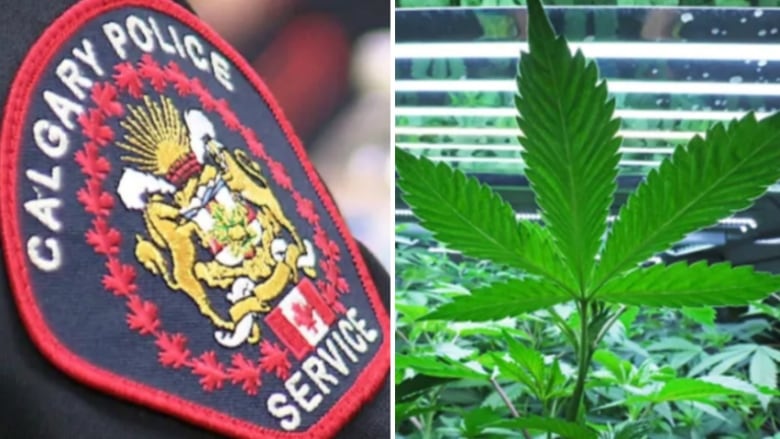Slow driver reactions front of mind for Calgary police ahead of cannabis legalization
Police urge people not to drive after using marijuana, saying it's too much of a gamble

Calgary police are predicting "a measurable" increase in collisions once pot becomes legal, saying stoned drivers are unlikely to react quickly to braking, stopping and turning.
"Cannabis is a different beast," says Const. Dan Kurz, one of Calgary police's drug recognition experts who trains fellow officers on how to spot potentially drug-impaired drivers.
He's not telling anyone not to give marijuana a try starting Wednesday, once it becomes legal in Canada — but he wants drivers to put away their car keys if they've consumed cannabis.
He says statistics show "rear-end collisions become a factor with people" who are under the influence of cannabis.
"It's too much of a gamble," he says.
"We can't say half a joint is impairing to every person because every single person reacts to that drug differently, they have different tolerances based on use and body structure," said Kurz.

He says research from the U.S. showed speeding was the number one reason for a traffic stop involving a driver who had used marijuana — the second most common offence by a stoned driver was weaving in and out of a traffic lane.
"Our judgment goes out the window and that's a scary thing," said Kurz.
More training for officers
This year, Calgary police added the Standardized Field Sobriety Testing to all of its recruit training classes. The three-day course helps officers better detect stoned drivers during a traffic or check stop.
Officers would compel a motorist to carry out three basic sobriety tests, an eye test, a "walk the line" test and a "stand on one leg test."
If the officer suspects impairment, the driver would accompany the officer to a district police station for further, extensive evaluation by a Drug Recognition Expert, or D.R.E.
That evaluation could include up to 12 steps, including physical examinations and taking a toxicological sample. Calgary police will require urine samples from suspected drivers who may be high.
The Calgary Police Service currently has 31 DREs and 287 S.F.S.T. trained officers, but the goal is to have one-third of the front-line contingent trained in S.F.S.T. by 2022. Calgary has just under 2,200 sworn members.
Police forces across the country have been given access to a new roadside testing device, the Dräger DrugTest 5000, but Calgary police do not yet have the machines.
Open to legal challenges
Calgary defence lawyer Dale Fedorchuk sees a number of possible court challenges of the drug-impaired legislation. He says the federal government rushed through the legalization of cannabis and left a number of unanswered questions that he suspects may have be to considered by the Supreme Court of Canada.
"I would love to have an opportunity to challenge this legislation, I truly would, I think there are significant challenges with it," he said.
Fedorchuk raises several red flags regarding Canada's new impaired driving laws:
- Most officers not trained or qualified to carry out Standardized Field Sobriety Tests.
- No reliable roadside screening device to detect marijuana use.
- Ability for police to carry out blood pressure, temperature and heart rate tests where officers may not be suitably trained.
- Urine test for THC may be unreliable, lengthy delays for results expected.
- No scientific evidence that shows a specific level of THC leads to impairment.

"There is a lot of scientific testing that has to take place before we can be satisfied that, for example, five nanograms of THC per millilitre of blood constitutes impairment, right now we don't have any of that," said Fedorchuk.
New penalties for drug-impaired driving came into effect in June, they include:
- 2 nanograms (ng), but less than 5 ng of THC per millilitre (ml) of blood; maximum $1,000 fine.
- 5 ng or more of THC per ml of blood; mandatory $1,000 for first offence, mandatory 30 days in jail for second offence, mandatory 120 days in jail for third and subsequent offences.
- Same penalties as 5 ng or more of THC apply if a person has both 50 milligrams (mg) of alcohol per 100 ml of blood, plus 2.5 ng or more of THC per ml of blood.
Const. Kurz says there are no plans to beef up enforcement starting at 12:01 a.m. Wednesday. He says officers will continue to operate check stops at least four times a week throughout the city, but they will always be looking for drivers who show signs of impairment.
"I'm hoping that the public are smart enough, and I believe they are, that they'll use [marijuana] responsibly," he said.
Bryan Labby is an enterprise reporter with CBC Calgary. If you have a good story idea or tip, you can reach him at [email protected] or on Twitter at @CBCBryan.

